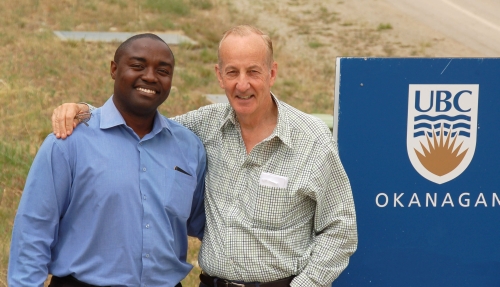
Donald Kololo, (left), chief pharmacist at Zambia’s Cancer Disease Hospital, visited UBC Okanagan last week to meet with nursing faculty and to tour the campus with Dr. Bill Nelems, a thoracic surgeon in Kelowna who has helped to establish the Zambia Health Initiative, a new research partnership between UBC Okanagan and the University of Zambia.
Donald Kalolo, chief pharmacist at the Cancer Disease Hospital in Lusaka, Zambia, is heading home from Kelowna with new information about easing pain and suffering for cancer patients recovering from treatment or who are dying.
Kalolo, who is working on a Master of Science degree in public health with a focus on palliative care, visited Kelowna last week as the first step in a new education and research collaboration between UBC Okanagan and the University of Zambia (UNZA) to develop a national program for palliative care in that African county.
“Our primary concern is improving the quality of patient care and this project gives us an opportunity to demonstrate what can be done by putting our heads together,” Kalolo said. “The collaboration between the universities is the best possible thing that could ever have been done. There is so much that we can accomplish through this partnership.”
While in Kelowna, Kalolo met with pharmacy contacts Laurel Kovacic and Dawn Dalen, and toured the B.C. Cancer Centre for the Southern Interior, meeting with Dr. Gillian Fyles and Michael Banwell, palliative care physicians. He paid a visit to the Kelowna Hospice community, meeting Diana Barker and her colleagues and also met with UBC Okanagan nursing professors Carole Robinson and Barb Pesut.
Touring Kelowna General Hospital surgical wards with anesthesiologist Dr. Norman Wickett, Kalolo witnessed the aggressive management techniques of pain control in post-surgical patients.
Working with Kalolo is Dr. Bill Nelems, a Kelowna-based thoracic surgeon who was raised in Zambia and is one of the architects of the Zambia Health Initiative and the UBC-UNZA collaboration.
“This is the next big part of our program, and we’ve had very productive meetings here,” Nelems said. “We are optimistic that through pilot programs in Mongu and Lusaka in Zambia, we can help Donald and his colleagues develop a national palliative care program. We are already providing assistance with the academic research background, and we will support the process of getting their national program going.”
Nelems, who will lead a medical-surgical team to Zambia as part of this initiative, said managing pain and providing palliative care is wise from a medical standpoint – patients who suffer pain after surgery have a higher mortality rate — but it’s also a matter of compassion.
“Cancer patients who receive treatment may not be curative, so you need to have pain and symptom control,” said Nelems. “When you provide compassionate care by managing a patient’s pain, they are more alert and able to deal with closure of life and spiritual issues, for example.”
Kalolo noted that very little pain-management is administered in Zambia’s hospitals, but after seeing how post-operative pain is managed here, he is convinced that the situation in Zambia can improve with better education and training for pharmacists.
“It was wonderful to see post-operative patients who are pain-free,” he said. “Currently in Zambia, we only use one narcotic and it would be nice to have more options. The key is to know when a particular pain intervention should be used – which one will let a patient go home sooner? To get to that point, we are looking at what resources and tools are needed to augment the existing pharmacy education programs in Zambia.”
The end result is helping people get better sooner, and if they are dying, to ease their pain, Kalolo said. “If you have an aggressive pain management and palliative care program, you can improve the life of the patient.”
About the UBC — UNZA collaboration
In addition to improving palliative care in Zambia, over the next eight years UBC and the University of Zambia will collaborate on research and training in the following clusters:
- Improving maternity and neonatal care and preventing death in rural and remote areas.
- Preventing HIV, tuberculosis and malaria and supporting people in remote, rural areas who are living with HIV.
- Exploring applications of genetic science and technology in public health in rural and remote areas.
- Establishing and sustaining lay community health workers as an appropriate and sustainable approach to improving population health and preventing death.
- Enhancing training of health workers “in place” (via e-learning and face-to-face instruction) to build capacity to achieve positive health outcomes.
- Using and adapting telemedicine technology to increase capacity for efficient diagnosis and treatment and achieve improved health outcomes in a resource-poor environment.
To find out more, contact Dr. Bill Nelems at 250.717.6088, (billnelems@fastmail.fm) or Dr. Gene Krupa at 250.762.9316 (currently in Zambia).
To contribute to the Zambia Health Research Initiative, visit the Okanagan campus Development website at www.ubc.ca/okanagan/invest and click on “Donate Now.” Type UBCO Zambia in the blank field to ensure your gift is designated to the Zambia Health Initiative.